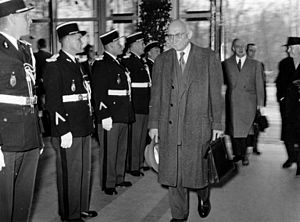Robert Schuman facts for kids
Quick facts for kids
Robert Schuman
|
|
|---|---|
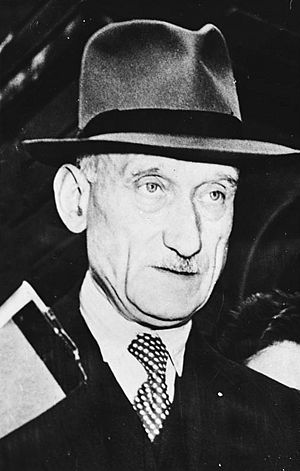
Robert Schuman, circa 1949.
|
|
| Prime Minister of France | |
| In office 5 September 1948 – 11 September 1948 |
|
| President | Vincent Auriol |
| Preceded by | André Marie |
| Succeeded by | Henri Queuille |
| In office 24 November 1947 – 26 July 1948 |
|
| President | Vincent Auriol |
| Preceded by | Paul Ramadier |
| Succeeded by | André Marie |
| Minister of Foreign Affairs | |
| In office 26 July 1948 – 8 January 1953 |
|
| Prime Minister | André Marie Himself Henri Queuille Georges Bidault René Pleven Edgar Faure Antoine Pinay |
| Preceded by | Georges Bidault |
| Succeeded by | Georges Bidault |
| President of the European Parliament | |
| In office 19 March 1958 – 18 March 1960 |
|
| Preceded by | Hans Furler |
| Succeeded by | Hans Furler |
| Personal details | |
| Born |
Jean-Baptiste Nicolas Robert Schuman
29 June 1886 Luxembourg City, Luxembourg |
| Died | 4 September 1963 (aged 77) Scy-Chazelles, Lorraine, France |
| Political party | Popular Republican Movement |
Robert Schuman (born June 29, 1886 – died September 4, 1963) was a very important French leader. He was born in Luxembourg but became a French citizen. Schuman was a Christian democrat who believed in Christian values in politics.
He served as Prime Minister of France twice. He was also a Minister of Finance and a Foreign Minister. Robert Schuman played a key role in creating important groups after World War II. These groups helped bring European countries closer together. He is known as one of the people who started the European Union, the Council of Europe, and NATO. In 2021, the Catholic Church called him "venerable" because of his strong Christian beliefs.
Contents
Early Life and Education
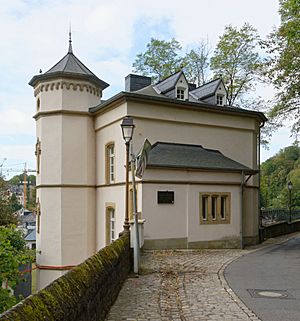
Robert Schuman was born in June 1886 in Clausen, Luxembourg. His father was from Lorraine and became a German citizen in 1871. His mother was from Luxembourg.
Robert grew up in Luxembourg City. He spoke Luxembourgish at home. He went to school in Luxembourg and later in Metz. From 1904 to 1910, he studied many subjects. These included law, economics, and philosophy. He studied at universities in Berlin, Munich, Bonn, and Strasbourg. He earned a law degree with top honors from Strasbourg University.
In 1912, Schuman started working as a lawyer in Metz. When World War I began in 1914, he was excused from military service due to health reasons. He worked in local administration from 1915 to 1918.
Political Career After World War I
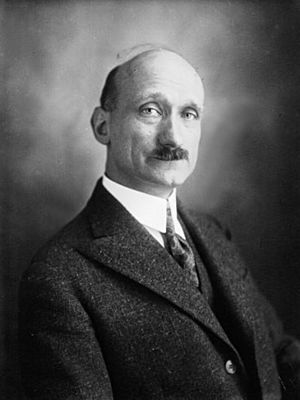
After World War I, the region of Alsace-Lorraine became part of France again. Robert Schuman became a French citizen in 1919. He then became active in French politics.
In 1919, he was elected to the Chamber of Deputies. This is like being a member of parliament. He represented the Moselle region until 1958. He helped create new laws to combine French law with the laws of Alsace-Lorraine. This was called "Lex Schuman." He also investigated corruption in local industries and railways.
Role During World War II
In 1940, Robert Schuman joined the French government. He was in charge of helping refugees. He voted to give full power to Marshal Philippe Pétain. Pétain supported making peace with Germany. Schuman refused to stay in the government after this.
On September 14, he was arrested for protesting against the Nazis. He was questioned by the Gestapo. However, a German lawyer helped prevent him from being sent to a concentration camp.
Becoming a French Minister
After the war, Schuman became very important in French politics. At first, he faced some challenges because of his past vote for Pétain. But he worked to regain his full civic rights. On September 15, 1945, he was able to return to public office.
Schuman served as Minister of Finance in 1946. He then became Prime Minister from 1947 to 1948. He helped keep the government stable during a time of many strikes. During his time as Prime Minister, he proposed ideas that led to the Council of Europe. These ideas also helped create the European Community's single market.
He became Foreign Minister in 1948. He held this job until early 1953. As Foreign Minister, he announced France's goal to create a democratic organization for Europe. He wanted a democratic Germany to join this group.
Building a United Europe
In 1949 and 1950, Robert Schuman gave many speeches. He spoke about creating a "supranational European Community." This meant a group of countries working together above their own national governments. He believed this would bring lasting peace.
On May 9, 1950, Schuman announced his famous plan. It is known as the Schuman Declaration. This plan invited Germany and other European countries to manage their coal and steel industries together. This would be done democratically in Europe's first supranational Community.
On April 18, 1951, six countries signed the Treaty of Paris. This treaty created the European Coal and Steel Community. This was a major step towards a united Europe. The Treaties of Rome (1957) later created the Economic Community and Euratom. These groups eventually grew into the European Union. May 9 is now celebrated as Europe Day.
As Prime Minister and Foreign Minister, Schuman also helped create the North Atlantic Treaty Organization (NATO). NATO is a military alliance for defense. Schuman signed the North Atlantic Treaty for France.
European Leadership and Legacy
Robert Schuman later served as Minister of Justice. He then became the first President of the European Parliamentary Assembly. This group is now called the European Parliament. He was given the title 'Father of Europe'. He is seen as one of the main people who started the European Union.
From 1955 to 1961, he led the European Movement. In 1958, he received the Charlemagne Prize. This award is given to people who help promote the idea of a peaceful and united Europe.
Schuman was a very religious person. He studied the Bible and was an expert in medieval philosophy.
Path to Sainthood
On June 9, 1990, the process began to consider Robert Schuman for beatification. This is a step towards becoming a saint in the Catholic Church. In May 2004, he was called a "Servant of God."
On June 19, 2021, Pope Francis declared Robert Schuman "Venerable." This means the Church recognizes his heroic virtues. It is an important step towards possibly becoming a saint.
Memorials and Tributes
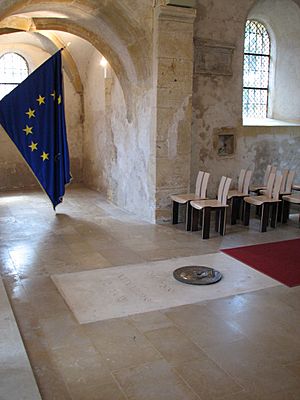
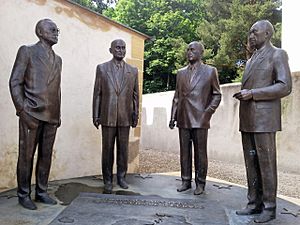
Many places are named after Robert Schuman to honor him. The Schuman District in Brussels has a metro station, a tunnel, and a square named after him. Many European institutions are located around this square. There is also a monument to him outside the Berlaymont building.
The European Parliament offers the Robert Schuman Scholarship. This helps university graduates gain experience working at the European Parliament.
A Social Science University in Strasbourg is named after him. There is also an "Avenue du President Robert Schuman" in that city. In Luxembourg, you can find a "Rond Point Schuman" and a "Boulevard Robert Schuman." There is also a school called Lycée Robert Schuman. The European Parliament building in Luxembourg is also named after him.
His birthplace in Luxembourg and his home in Scy-Chazelles can be visited. In 1952, he received an honorary doctorate from Tilburg University in the Netherlands.
The European University Institute in Florence, Italy, has the Robert Schuman Centre for Advanced Studies. This center studies European integration. The Robert Schuman Institute in Budapest, Hungary, also carries his name. It promotes the idea of a united Europe.
See also
 In Spanish: Robert Schuman para niños
In Spanish: Robert Schuman para niños
 | Toni Morrison |
 | Barack Obama |
 | Martin Luther King Jr. |
 | Ralph Bunche |


